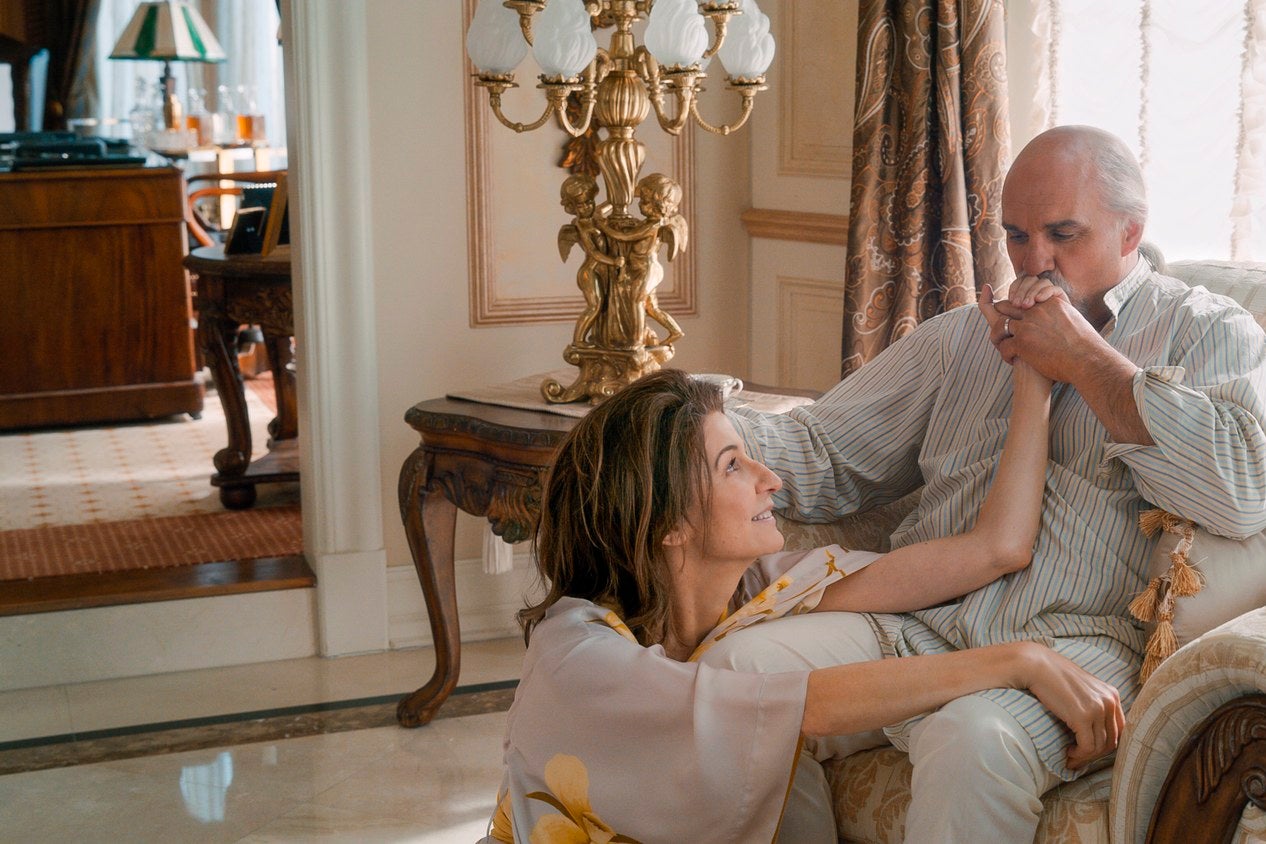Last July, my brain rattled as the reports began to come from France about, as The New York Times put it, “the crazy Celine Dion movie … that has all of Cannes buzzing.” This was Aline, a drama depicting a stand-in version (“Aline Dieu”) of the Quebec-to-Vegas superstar singer, from childhood through adolescence to nearly the present day, played—including as a five-year-old and a tween—by the film’s French writer-director-actor Valérie Lemercier, aged 57. The Times’ reviewer Kyle Buchanan and various Twitter reactors were aflutter with adjectives: Nervy! Uncanny! Bizarre! Insane!
I avoided learning more about the film to preserve the revelation for myself, even as the pandemic and other behind-the-scenes delays conspired to keep Aline from opening in North America until now, nearly a year later. At last, I thought: Enabled by the scrim of fiction, a fantasia on the theme of Dion’s improbable life that might do justice to all that improbability, to her singular presence in the showbiz pantheon. The excursion would surely be touched by the spirit of all the drag queens who’ve mimicked her; the international fan base that channels her through its own cultural filters; and the divided self—arrested-development child star, disciplined artist, chaotic celebrity, spontaneous goofball, gushing feeler of feels (her corporate entity is called Les Productions Feeling)—that Dion has displayed through her decades in the limelight.
Having become, to my bemusement, something of a professional Céline watcher through a twist of critical fate, I also boggled at how this “fiction liberally inspired by the life of Céline Dion” could possibly exist—complete, mind you, with permission to use many of her songs, sung throughout with remarkable fidelity by French singer Victoria Sio (dubbed in over Lemercier, à la Marni Nixon over Audrey Hepburn in My Fair Lady). I’m well aware of how protectively Dion’s people have stood guard over her image and her narrative. Premier among those people, of course, was her late husband René Angelil, who signed a 12-year-old Dion as a management client in 1981, married her in 1994, and died of throat cancer at 73 in early 2016.
But after finally watching Aline last week, I was left instead singing along with another diva, Peggy Lee: “Is that all there is?”
Outside of a handful of scenes, to call Aline a standard biopic would be to exaggerate its thrills recklessly. For the bulk of the two-hour runtime, it ticks off the milestones of Dion’s life at such a dutiful pace that any real fan would be able to shout out what’s coming next: losing her voice, check; getting it back; René (here known as Guy-Claude) having his heart attack; winning her “My Heart Will Go On” Oscar (ooh, she changed dresses at the last minute!); trying to get pregnant; having a baby; starting her Vegas residency; having more babies; etc., etc.
Each minor setback is resolved scant minutes later, only to be followed by another. None is marked by any ongoing conflict except the stress of being a very busy famous person. Eventually, of course, Guy-Claude dies, and Aline is sad. But then she talks to his ghost, feels better, and sings about self-actualization. Fade to black.
All the fuss, then, is really about the first half-hour, when Lemercier’s special effect- and prosthetic-aided masquerade as the young Dion—at once absurd and jarring—suggests a visual metaphor for a child blessed and burdened with a grown-up talent. The film portrays her rural Quebec home life with a farcical magic-realist ambience. Aline’s family and dozen-plus siblings (all the boys are named Jean-something, the girls Something-ette) are played with vim by the film’s ensemble of Québécois actors, who suggest some kind of good-natured experimental theater troupe. But the arrival of Guy-Claude rapidly disperses all but wispy remnants of that elan, though it’s welcome to see some of the siblings sticking around as members of Aline’s équipe later in the film (as they did in life).
Even into the second act, there’s the dramedy of Maman Dieu (Quebec’s formidable veteran actor Danielle Fichaud) keeping fierce tabs on her teen daughter’s developing entanglement with her manager. She proclaims to Guy-Claude that she’ll strangle him rather than learn he’s put his blubbery paws on her “princess.” These scenes are fictional—much to the displeasure of Dion’s real-life family—but one does hope Dion’s mother or anyone around her had such concerns at the time. Lemercier’s decision to cast herself as the young Aline might also serve to prevent the audience from dwelling on the unsettling age gap enough to throttle the film’s light-heartedness in turn.
But all this is forgotten shortly after the relationship is consummated—at Aline’s instigation and at a legally consenting age, in the film as in the official biography—and the couple is married. Maman and the movie from there on wholeheartedly endorse the central love story, the way it’s always been sold to fans. Stylistic and storytelling tensions evaporate, and rote naturalism takes over.

What remains yields minor pleasures, such as the growth of Aline’s friendship with her gay makeup artist Fred (a sympathique Jean-Noël Brouté). But little else stands out until after Guy-Claude’s death, when Aline sneaks out alone into the Las Vegas dawn—everyone on the streets assumes she’s just another would-be Aline imitator—to witness the city life she’s never glimpsed in all her years performing there, fetchingly soundtracked by fellow Montrealer Rufus Wainwright’s “Going to a Town.”
That this spin on the king-disguised-as-commoner trope is another fabrication becomes obvious when Aline goes AWOL from her Vegas show that night, which the real Dion would never do. The scenario could hint at the ways a half-frozen personality might find some liberation after the loss of a husband/boss, as we’ve seen in Dion’s recent real-world transformations. But Lamercier is too besotted with the couple’s romance to go that far. Instead, she recuperates the message to emphasize that Aline ultimately is just “an ordinary woman,” as she sings in the final number. (It’s a rewrite of the song “Ordinaire” by a previous-generation Quebec chansonnier, Robert Charlebois, the original version of which also opens the film.) And thus Aline becomes, for all its threatened outlandishness, at best an ordinary movie.
It’s not that I wish Aline took more advantage of its fictional liberties to mock or undermine Céline Dion. I just wish it had much more to say about something—such as child stardom, what it’s like to move from working-class margins to opulence, or the simultaneously reverent and condescending relationship that pop culture had with Dion at her 1990s peak. (The film grazes that topic with a couple of depictions of gossip on Quebec TV, but little more.)
There’s much more meat, for example, in the Quebec play Bliss by Olivier Choinière (produced in English at London’s Royal Court in 2008), revolving around a deluded Dion obsessive, which used the icon to pose questions about celebrity and extreme fandom. Alternatively, a good contemporary film about Dion might present a feminist-revisionist take, along the lines of recent looks at mistreated female figures of the period, such as Monica Lewinsky, Pamela Anderson, Tonya Harding, and Britney Spears.
Love it or not, fairy tale or nightmare, Dion’s story is done much deeper disrespect by being rendered boring. But long after Aline loses its creative heart, it still goes on and on.
